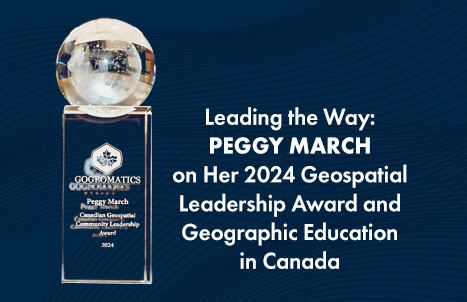
There are people you meet during your life who are an inspiration to you and others. Peggy March is one of those people. Some might know her as RebelGeo on Twitter. 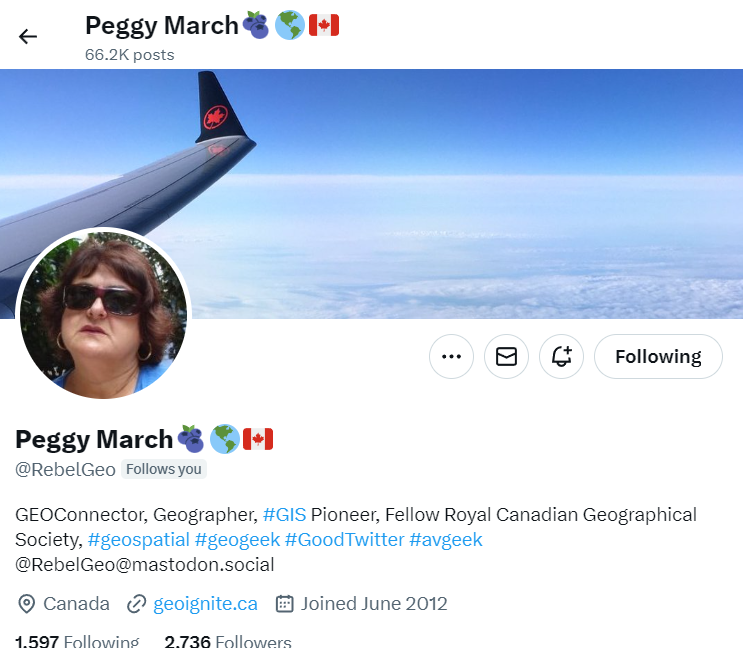
Geography is of prime importance to Newfoundland’s history, shaping its rich physical landscapes, resources, and culture. Peggy March, born and raised in Newfoundland, embodies the spirit and resilience characteristic of living in this beautiful but harsh environment.
Peggy attributes her love for geography to her natural curiosity, shaped by her teachers, especially professors at Memorial University of Newfoundland and Labrador’s Department of Geography. She jokingly says she probably took almost every course offered in the program.
This background has profoundly influenced her passion for geography and education, driving her to promote geographic literacy and the use of Geographic Information Systems (GIS) in education.
On behalf of the GoGeomatics Canada community, it is a great honor to announce that Peggy March has been awarded the 2024 Canadian Geospatial Community Leadership Award at the GeoIgnite conference held in Ottawa from May 13-15. The award recognizes individuals who have made significant contributions to the geospatial community in Canada, and Peggy March is a most deserving recipient.
Peggy March’s journey in geographic education and the geospatial sector is rich and interesting. As a former instructor at Memorial University and the Atlantic Canada representative for Canadian Geographic Education, Peggy has been a driving force in promoting geographic literacy and integrating Geographic Information Systems (GIS) into K-12 education. Her efforts have inspired countless students and professionals, fostering a deeper understanding and appreciation for geography.
Peggy’s accolades include being a Fellow of the Royal Canadian Geographical Society, receiving the Distinguished Teaching Award from the National Council for Geographic Education, and the Prime Minister’s Award for Teaching Excellence. These honors highlight her exceptional ability to inspire, mentor, and lead within the geospatial community.
Beyond her educational contributions, Peggy has been an advocate for geographic education at the governmental and organizational levels. She has tirelessly worked to align her efforts with the United Nations’ sustainable development goals, ensuring that geographic education receives the support and recognition it deserves.
Peggy has also been instrumental in connecting the Canadian geospatial community with the international community through her use of social media, first using Twitter and now on LinkedIn.
Peggy’s leadership and advocacy have left an indelible mark on the Canadian geospatial community, and we are honored to celebrate her achievements.
Please join us in congratulating Peggy March on this well-deserved recognition. Her work continues to inspire us all, and we look forward to her ongoing contributions to our community.
Congratulations, Peggy!
We reached out to Peggy to ask her about her work and the award. What follows is that exchange.
GoGeomatics: Why is the Canadian Geospatial Community Leadership Award important to you?
Peggy March: The award is important to me because it represents progress, achievement, and the power of connecting, networking, and sharing together.
I appreciate the recognition of being the recipient of the GeoIgnite 2024 Community Leadership Award. I have been active for decades in the promotion of all things geospatial, and its key contributions and applications to the complexities of today. I have always considered myself to be part of a team, and my rationale has been to achieve goals in a collaborative mindset. The world geospatial team is vast and committed; and the team at GoGeomatics and GeoIgnite has always been a pleasure with which to collaborate. I am honoured to be part of this team.
GoGeomatics: Why is geography important?
Peggy March: Geography is “the science of everything” which unifies many disciplines. Those taught through the lens of geography to examine various perspectives acquire deep critical thinking skills. Geographers utilize both objective and subjective knowledge to synthesize findings to facilitate problem-solving and decision-making. Geomatics, GIS, and an array of earth observation technologies support this.
GoGeomatics: You have been guiding, nudging, and, when needed, sometimes cajoling, the community to recognize the importance of geoliteracy in Canada. What are you thoughts on the state of geographic education from K-12 in Canada today?
Peggy March: The state of geographic education in Canada has been eroded for a decade or more. Geography has disappeared as a core subject in many high school programs. Because education is a provincial jurisdiction and is legislated, it may be influenced by politics. An example of this is the recent reconfiguration of the Alberta curriculum, which has generated controversy.
I emphasize strongly that curriculum is a legal document. I encourage parents to review the prescribed curriculum for their children and consider advocating on areas of concern with education providers.
GoGeomatics: Over the last 5 years, there have been a number of geospatial and geomatics post-secondary programs that have closed at the college and university levels in Canada. Some notable closures include the York Geomatics engineering program, Fleming College GIS programs, Niagara College GIS program, and the Victoria Island University GIS programs, to name a few. What is going on?
Peggy March: This sad state of affairs reinforces my previous answer. The dismemberment of geoliteracy in K-12 is having a deleterious impact on universities and colleges, which erodes geoliteracy within the workforce.
We’ve taken our eye off the ball, as we did in the early ’90s. Focus is hard for both the public and private sectors. The current level of complacency and loss of interest in geoliteracy is typical, but it is important to realize this is not acceptable, and stakeholders need to be continually assessing future needs. A literate population is good for society as a whole.
Even if everything is fine in our personal lives and professional niches, we can never assume everything is going well in other areas like education. The loss of these programs is the loudest and shrillest alarm to date.
A key component of a healthy K-12 education should include geoliteracy and geographic thinking. To do that, it requires properly trained teachers and instructors from kindergarten through to post-secondary education.
This ultimately transfers into demand for professional training in colleges and universities.
Businesses need to support education and raise awareness with governments and the public to ensure programs are not weakened. We are all connected.
Strength in teacher training of geoliteracy skills may be uneven, depending on the training institution and the province. Ontario currently has the highest delivery of geoliteracy.
Bottom line: If students don’t know about the careers available through geospatial, they don’t choose them. It’s simple.
This issue is exacerbated by the ever-revolving “identity crisis” and the rapid integration/use of geospatial technologies into almost every profession.
GoGeomatics: You have been an advisor to Canada’s national leadership conference since its inception in 2018. What were the highlights of the 2024 GeoIgnite program for you this year?
Peggy March: Although I was unable to attend in person, the highlight of GeoIgnite 2024 was the excitement of knowing that one of the most influential and prolific members of the geospatial community, Steven Ramage, CEO of the Committee on Earth Observation Satellites (CEOS), would be in attendance and presenting the keynote. Steven is a unifying figure in the world geospatial community, an inspiring mentor, and a catalyst in bringing members together through leadership.
I wish I could have personally met Steven after 10 years of various interactions in the same circles.
GoGeomatics: Who has inspired you in your career?
Peggy March: Many dedicated people have inspired me, one of whom was a dear former colleague of mine, since deceased, Patricia Green-Milberg. Patricia was what we called at the time, a “geoevangelist.” I, too, am guilty. We had collaborated on a long list of geography-related conferences and projects through the Royal Canadian Geographical Society and the Canadian Association of Geographers. I received a call from her one day. She asked me if I knew of a Steven Ramage. Yes, I replied. Surprisingly, they had been seat-mates on a flight from Geneva to Montreal. In a conversation, Steven asked Patricia if she knew Peggy March. Coincidence? An intersection of two role models. I think it was fate.
GoGeomatics: Which thought leaders are you following now and who do you engage with?
Peggy March: Alex Verbeek is a prominent persona from the environment and climate change world who was present at GeoIgnite 2024. Alex, through his advocacy for caring for the earth, is very well-known in academia, government, and on social media.
GoGeomatics: What are your hopes for the next generation of geospatial professionals?
Peggy March: In my journey to contribute to the geospatial world, I have encountered many individuals who are selflessly contributing to the knowledge of the bigger picture. I guess you may say that it represents the process. If I ask anything of the younger cohort of geospatialists, it is that I hope they find inspiration to continue the legacy.
GoGeomatics: What tools do you use in your advocacy?
Peggy March: If any of you reading this are familiar with my writings on GoGeomatics, you will discover that I used Twitter as a valuable tool to keep abreast of people and events in the “Geoworld.” Unfortunately, we all know why that is no longer of as much value as it used to be.
GoGeomatics: How has your transition to using Linkedin been? Have you found a new platform? Can our readers connect with you on LinkedIn?
Peggy March: I’ve been experimenting. X is a disaster. I still use it to observe the changes, but the networks, including the geospatial one within X, are broken. I joined both Bluesky and Mastodon last fall when everything fractured.
Bluesky had potential, but as it grew, you could see the shifts—too much American political noise. Mastodon, aka “The Fediverse,” shows more promise: global perspectives and diversity. Because it is self-regulated, it is more comfortable, and you can have decent exchanges and actually learn something.
After being coaxed back on LinkedIn, I rejoined. I had previously left LinkedIn. However, LinkedIn is now one of the best places to be for geospatial networks, events, connections, and discussion. For now, I keep a low profile and use my LinkedIn profile as a monitor.
GoGeomatics: Please join us in congratulating Peggy March on this well-deserved recognition. Her work continues to inspire us all, and we look forward to her ongoing contributions to our community.

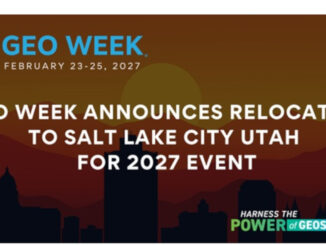
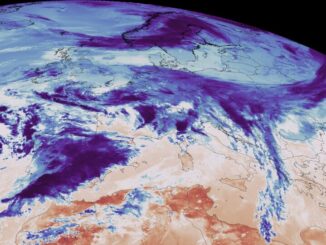
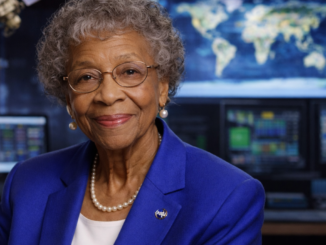
Be the first to comment